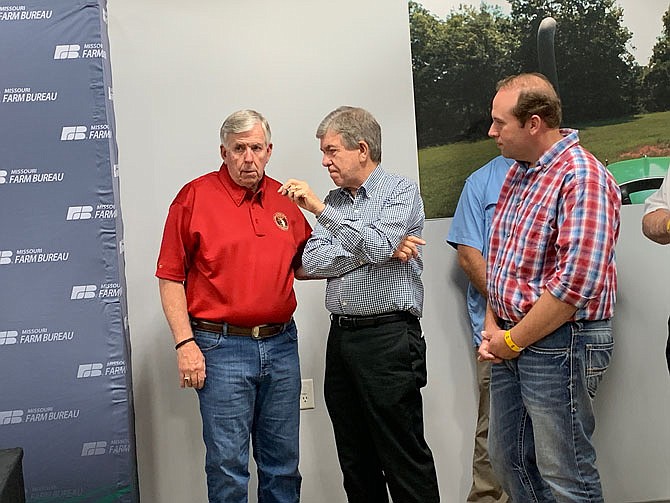If nothing is done to prevent future flooding, the state will be facing a similar disaster in the future, Gov. Mike Parson warned a small crowd Thursday at the Missouri State Fair in Sedalia.
"If we do nothing, we're going to be standing right here in front of you five years from now when we have another flood, and nothing's going to change. We cannot afford to do nothing in this state," Parson said. "We have got to find a way to work with our federal delegations and work with my fellow state governors. We should have a seat at the table on the management of the Missouri and the Mississippi rivers."
For the first time in over a decade, Parson said, the state budget put aside money to save for disaster recovery - more than $100 million.
"We saw the devastation that was coming from these floods - which means roads, which means lands; repairs were going to be huge," he said. "We needed to prepare on the state side to having some funding in there to help us get through these tough times."
Parson said he has two priorities for the Missouri River - the safety of Missourians and the property of farmers.
In July, Parson signed an executive order to establish the Flood Recovery Advisory Working Group to focus on the state's recovery. The group, made up of the directors of the Department of Natural Resources, Department of Agriculture, Department of Economic Development, State Emergency Management Agency and Department of Transportation, as well as representatives from several state groups including the Missouri Farm Bureau, Missouri Levee and Drainage District Association, and farming groups.
The working group is meant to provide input on the state's short-, medium-, and long-term flood recovery, including possible improvements, according to the executive order. An initial report by the group is due to the governor by Dec. 31, and a final report will be due May 31, 2020, when the group will be dissolved.
Along with Parson, U.S. Sen. Roy Blunt and U.S. Reps. Billy Long and Jason Smith attended the press conference at the Missouri Farm Bureau building.
Also in the audience were Lt. Gov. Mike Kehoe, Missouri Agriculture Director Chris Chinn, Missouri State Treasurer Scott Fitzpatrick, Secretary of State Jay Ashcroft and several state legislators.
Missouri Farm Bureau President Blake Hurst echoed the challenge of Parson that the main focus of recovery should be improvement.
"As you are all aware, and some of you are painfully aware, this past spring and early summer, our state suffered events which left our farmers and ranchers at tremendous loss," Hurst said.
Across the state, he said, more than 100 levees were breached, hundreds of thousands of acres were lost and more than $1 billion in damage occurred.
"There's no easy answer to these problems, but if all we do is get back to where we were this spring, we will have failed," Hurst said. "If we don't make improvements to the way we manage the river we will have failed."
During his time at the microphone, Blunt focused on making changes to what had been done in the past.
"I think on the Missouri River there is a real opportunity to do something about the 2004 River Management Plan," Blunt said. "In 13 of the 15 years since that plan went in to effect, we've had either moderate or severe flooding."
Blunt said the amount of rainfall in the years since 2004 hasn't increased, and the 2004 plan is too focused on wildlife issues and not enough on people and property.
Smith, who represents Missouri's 8th District, said the Missouri River needs similar infrastructure to what the Mississippi River has. In March, he said, the junction of the Ohio and Mississippi rivers hit the highest flood stage in history, but the levees were never activated. Smith called for similar infrastructure across the state.
"It needs to be about flood control, not environmentalism," Smith said.

